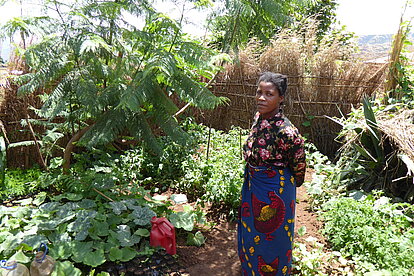
Climate & Health
How climate change affects our health
According to the WHO, climate change is not just an environmental crisis, but the most serious global health threat. Heat stress, changing climatic conditions, increasing extreme weather and air pollution are worsening human and planetary health worldwide. The climate crisis first of all jeopardises weak health systems in the global South. In Difäm's partner countries, climate change is altering the burden of disease and threatening the healthcare infrastructure. Healthcare systems in these countries are often very poorly equipped to respond to the increasing burden.
Unfortunately, this particularly affects the people who have contributed the least to the climate crisis. As a result, the climate crisis multiplies the need for humanitarian aid and intensifies existing conflicts.
Consequences of climate change will severely affect the most vulnerable

Prolonged droughts, flooding and soil degradation reduce agricultural yields, leading to malnutrition and undernourishment. Children are particularly affected and their physical and mental development is impaired in the long term. They, as well as pregnant women, suffer particularly from infectious diseases that are newly surfacing via mosquitoes in areas that were not previously affected by malaria or dengue. The combination of a lack of water, poor hygiene and contaminated water sources after flooding leads to the rapid spread of diarrhoeal diseases such as cholera and typhoid. Children and vulnerable people bear the greatest health risk. All these changes affect the foundations of basic health, which Difam is particularly committed to in its partner countries.
The loss of basic livelihoods due to climate change is forcing many people to migrate, which creates new health risks: overburdened refugee camps with inadequate medical care and increased susceptibility to infectious diseases.
Our goal: sustainable behavioural change and climate-resilient healthcare systems
At Difäm, we are working with our partners to find approaches that can help local communities to better adapt to climate change and its consequences. This requires better basic health care and improved living conditions - a prerequisite for good health, above all ensuring clean water sources and risk-free toilet and wastewater disposal as well as sufficient agricultural yields.
We are committed to adapted and resilient healthcare systems, particularly in rural and disadvantaged regions. The upgrading of medical infrastructure, trained and sensitised specialists and a reliable and economical supply of medicines, including new low-emission methods, can help to treat diseases faster and contain outbreaks more quickly. We are also committed to developing digital solutions that will improve care structures and provide medical care more quickly and efficiently to patients in need. And by providing solar power, we help make healthcare facilities self-sufficient and emission-free. After all, in our partner countries, as well as in Germany, healthcare facilities also contribute to climate change. For example, the production of waste and the unprofessional incineration of medical waste contribute to the emission of pollutants and significant environmental pollution.
We are also committed to sustainable behavioural change, such as the recycling of valuable raw materials, in order to combat the causes of climate change in the long term. For many people, the campaign we initiated for the recycling of mobile phones is a flagship for the conscious use of mobile phones, computers and other internet technologies.
Climate change is one of the greatest challenges of our time, which has a massive impact not only on the environment but also on global health. Joint action at a political, economic and social level is essential in order to minimise health risks and protect people in the Global South in particular.


